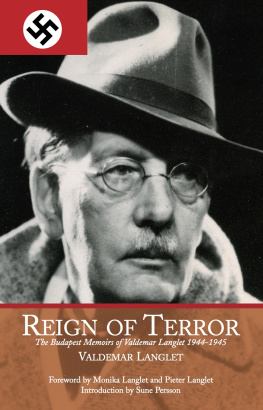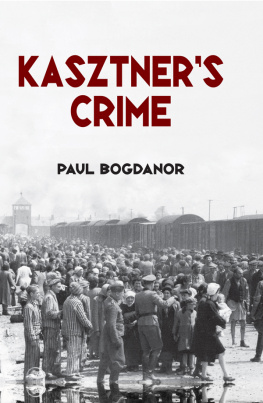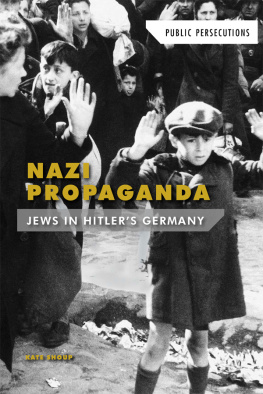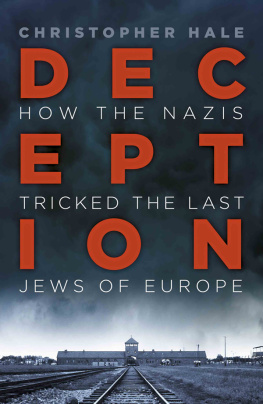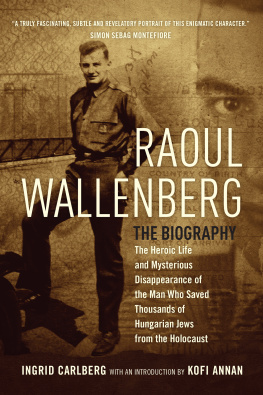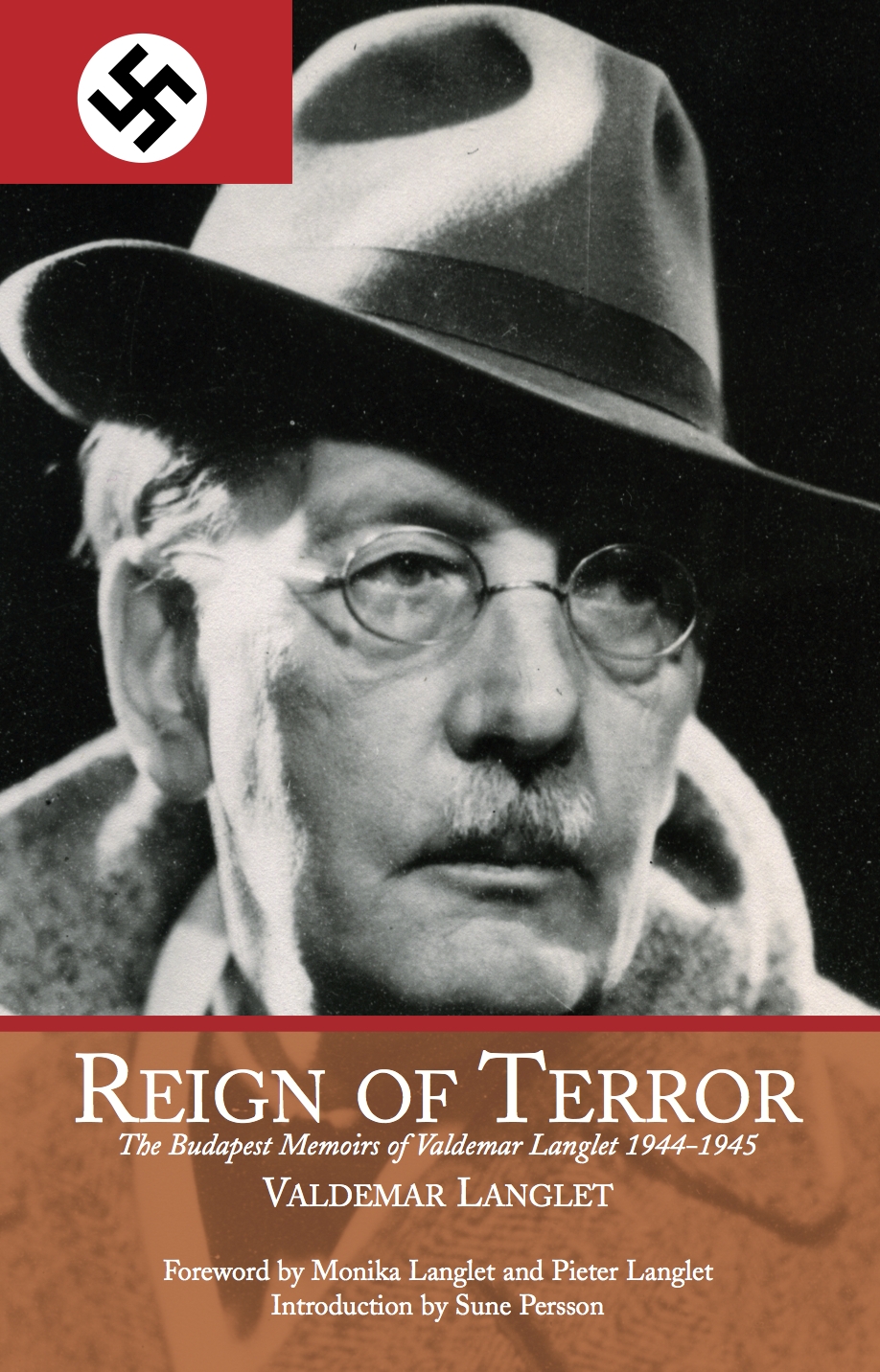THE FIRST ACT:
The Deportation of the Jews
A ROUND six oclock on a Sunday morning in the early spring of 1944 a vast number of aircraft could be seen swarming over the city of Budapest. No alarm was heard, no bombs were dropped.
Practice flights performed by Hungarian squadrons?
No, the planes were German with swastikas. What were they doing here, with no visible enemy around, and why were they circling round and round and round, and not returning to where they had come from? Nobody could say, but evidently something was brewing.
My telephone rang at eight oclock did I know what was going on? Not the slightest idea, but it certainly looked damned strange...
Half an hour later the explanation arrived. A Hungarian newspaperman had the information The entire city is overrun by Germans. Theyve taken command of police headquarters, the General Post Office, telegraph and radio stations. Long columns of German military vehicles are scouring the streets. The Palace and the Ministry buildings up on the hill are under German guard, patrols are out arresting all the political leaders who have shown little or no sympathy for the Germans. Mainly theyre after people of Jewish descent and liberal attitudes.
And the Regent?
He had been invited to visit Hitler, who wished to persuade him to promise to make available a large Hungarian army contingent, and he should have been back on the Saturday. On the way home, however, some hindrance had regrettably prevented His Excellency from continuing his journey until the following day.
During this time German tanks and lorries had sped over the border straight for Budapest, a distance they covered in a couple of hours. When Horthy was finally released and reached the capital, he found it already kidnapped as Copenhagen had been in April 1940. Our mighty allys tactics had been well rehearsed in the assaults on Denmark and Norway, and the Germans widely celebrated striking power and organisational capacity did not fail to meet expectations this time either. The choice of day could not have been better, either: Sunday, the day of rest in government offices and ministries, at least for those whose boss was not tipped off in advance of the plot; out of a dozen or so ministers there were at least four or five reliably sympathetic to the German cause, whom it was not necessary to render harmless. The remainder were pulled in with unerring precision by the Gestapo, which had taken immediate possession of police headquarters and other essential detention centres, and had set up its own centre of operations in a couple of well-appointed hotels up at Schwabenberg on the Buda side. Prime Minister Kllay was able to reach safety at the very last minute in the Turkish embassy, where he was protected by extraterritorial immunity but was unable to confer with the Head of State as the telephone had naturally been cut off.
Within a few hours the Germans were certain that no highly-placed official remained in the civil and military administrations capable of joining a popular revolt against the occupying power, or who had not immediately gained a secure hiding place. At the Palace, surrounded by German troops, the Regents hands were firmly tied by threats of bombardment and destruction of the capital unless he agreed to appoint a new government, clearly in line with German wishes. In order to avoid bloodshed and the risk of a civil war, he found himself forced to yield to these demands, most probably in the hope that, remaining at his post, he could better serve the country rather than by burning his boats and allowing himself to be carted off to Germany as a prisoner.
A few days later the composition of the new government thus arrived at in legal form was made known. General Sztlay, the Hungarian envoy in Berlin, was appointed both head of government and the now largely unimportant Foreign Minister: his collaboration in the coup had probably been assured of beforehand. In order to put a suitable complexion on the whole matter at least outwardly to satisfy Hungarian national feeling it was decided to retain in their posts those ministers whose loyalty to the German regime could not be called into question. It was openly reported that Imrdy was urged to join the government, but that he had made conditions that were unacceptable to the Germans.
The Ministry of the Interior, of prime importance at this juncture, was handed to the former leader of the Hungarian minority in Czechoslovakia, Jaross, a marked nationalist. He had no hesitation in appointing as his Permanent Secretaries two of Hungarys wildest anti-Semites, the former gendarme Major Baky and the civil governor in Pest, Endre. Knowing something of the previous careers of these gentlemen Endre wanted everybody who was not of pure Hungarian blood chased out of the regained territories, and Baky was considered to be even worse it was not difficult to work out that what was under way was the extermination of the Jewish population, following the German pattern.
During the very first week following the coup, not only all prominent Jewish businessmen but also Jews who occupied important positions in the cultural life of the city were either arrested or deported to Germany. Similar measures were taken with the leaders of the political left, in the event they had not found a safe place abroad, as was the case with the Liberal Party boss Eckhardt and a few leading Social Democrats.
The observation was later made in some quarters that a few Hungarian regiments loyal to the government could well have outflanked the Germans and nipped the coup in the bud. But were there such regiments at hand? And even if there had been, it is difficult to see what could have been gained by such a move. The Germans had air supremacy and the element of surprise, while the Russian steamroller in the east was still an immense distance away, and what there was of a Hungarian army lay mostly at different points along the German frontline; the border guard would hardly risk leaving its positions at Siebenbrgen for fear that the Romanians would seize the opportunity to immediately occupy the territory, which could then never be recovered. In addition to which corps commanders and officers in general were invariably either pro-German and secret members of the Arrow Cross, or they were indecisive. The army lacked leaders capable of inspiring others to join a resistance movement of any size. The cunning calculation which had provided the country with what was formally a fully legal government would have meant that any armed revolt was interpreted as just that open revolt and would have led to the risk of those involved being tried for treason should it fail. No such bold venture was on the cards.
The government had the support of the enormous war machine provided by the Germans. Knowledge of what had happened to the Poles and the Yugoslavs, the Belgians and the Dutch, the Danes and the Norwegians, was depressing enough for a small, under-equipped nation, which was also split and disunited. No aid was to be expected from the West, and Russian help at that point in time was not to be thought of. Matters would have to take their course, and it turned out to be anything but pleasant.
Endre and Baky were not slow to move. The systematic persecution and total annihilation of the entire Jewish population only the capitals broad masses were spared for the moment started as early as April, and proceeded along two routes. One of them, for which Endre was responsible, was the setting-up of fenced-in Jewish ghettoes in the larger provincial cities, with the aim of concentrating all Jews in one place where they could be dealt with in an entirely arbitrary fashion. The other, led by Baky and employing his newly-hired gendarmes as executioners, was the deportation to Germany of hundreds of thousands of Jews.

